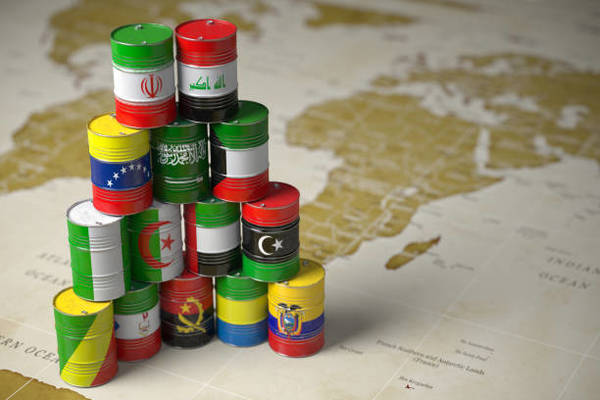OPEC may cancel planned output increase – analysts
OPEC may reconsider its earlier decision to unwind production cuts as sluggish global demand growth and rising non-OPEC output continue to cap Brent’s price gains, according to market analysts.
 PHOTO: Oil barrels in the colour of flags of OPEC countries on a world political map background. Getty Images
PHOTO: Oil barrels in the colour of flags of OPEC countries on a world political map background. Getty Images
The Organization of the Petroleum Exporting Countries (OPEC) is expected to keep the ongoing production cut in place for the rest of this year. In June, the coalition decided to gradually phase out its combined supply cut of 2.2 million b/d between October 2024 and September 2025.
A lacklustre growth in oil demand on the backdrop of tepid economic trends in leading oil-consuming nations like China, coupled with a steady rise in non-OPEC production, will prompt the Saudi Arabia-led group to reconsider its output plans, according to a few oil analysts.
“The market continues to muse over OPEC’s next move,” ANZ Bank’s senior commodity strategist Daniel Hynes said. “Expectations are growing that these plans may be delayed,” he added.
Non-OPEC output on the rise
Recent increases in oil production from non-OPEC producers have contributed to some weakness in oil prices. In response, market analysts now anticipate that the Vienna-headquartered group may postpone its plans to lift production cuts.
The International Energy Agency (IEA) expects global oil output to grow by 730,000 b/d in 2024, mainly driven by leading non-OPEC producers including the US, Brazil, Canada, and Guyana.
“While OPEC+ has stabilized prices, this has also encouraged non-OPEC+ production, now complicating efforts to increase output without harming prices,” Ole Hansen, head of commodity strategy at Saxo Bank said. An increase in production in October “looks increasingly unlikely,” he added.
Weak demand growth in China
In recent months, refinery activity in China, a key driver for crude oil demand, has weakened. This has added downward pressure on Brent’s price, making it difficult for OPEC+ to unwind its production cuts from October, Hansen further said.
“The downward pressure on prices makes it increasingly likely that OPEC+ will have to scrap their plans for gradually increasing supply from October,” two analysts from ING Bank said. “Failing to do so, will likely put further pressure on prices,” they added.
Oil consumption in China, the world’s second largest consumer dropped by 8% year-on-year to 13.55 million b/d in July, China’s General Administration of Customs (GACC) reported. This has raised concerns about the economic health of the country and capped oil price gains.
“It is increasingly likely that the group will have to ditch plans to start increasing supply from October. However, this will depend on where the market is trading towards the end of September,” ING Bank’s analysts said.
The group will convene next on 2 October to discuss production targets and output cut plans.
By Aparupa Mazumder
Please get in touch with comments or additional info to news@engine.online





